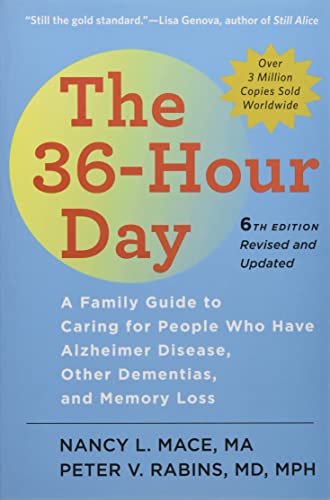The Best Elderly Caregiving Books
- 1 The 36-Hour Day: A Family Guide to Caring for People Who Have Alzheimer Disease, Other Dementias, and Memory Loss
- 2 How to Care for Aging Parents: A One-Stop Resource for All Your Medical, Financial, Housing, and Emotional Issues
- 3 Grace for the Unexpected Journey: A 60-Day Devotional for Alzheimer’s and Other Dementia Caregivers
- 4 The Complete Eldercare Planner: Where to Start, Which Questions to Ask, and How to Find Help
- 5 A Bittersweet Season: Caring for Our Aging Parents – And Ourselves
- 6 Can’t We Talk about Something More Pleasant?: A Memoir
The 36-Hour Day: A Family Guide to Caring for People Who Have Alzheimer Disease, Other Dementias, and Memory Loss


First published in the early ‘80s, The 36-Hour Day is the definitive dementia care guide. This best-seller from Johns Hopkins is an indispensable resource, offering comprehensive support, direction, and comfort for families, friends, and professionals who provide home care. Caregiving suggestions come from people who have experienced symptoms of dementia themselves, other caregivers, and Alzheimer’s professionals and advocates. Useful takeaway messages address challenges that are unique to people afflicted with Alzheimer’s disease, memory loss, and dementia disorders and their caregivers.
Topics encompass the progressive disease from beginning to end, including defining dementia, getting medical help, recognizing and managing symptoms, when independent living turns into daily care, associated medical problems, resources, managing your role as a caregiver, caring for yourself, financial and legal issues, long-term care arrangements, preventing and delaying cognitive decline, causes of dementia, and research.
Pros
- Well researched and accurate
- Neurologist recommended
- Easy to use index
Cons
- Not for Early or Mild Cognitive Disorder
- Some reviewers complain the font is too small
Key Features
- 6th Edition
- Definitive dementia care guide
- Detailed, practical, and compassionate advice
- Available in paperback, hardcover, and e-book
Specifications
- Publisher: Johns Hopkins University Press
- Published Date: April 18, 2017
How to Care for Aging Parents: A One-Stop Resource for All Your Medical, Financial, Housing, and Emotional Issues


This best-seller has been featured on ABC, AARP, and in The Washington Post. A road map for adult children, How to Care for Aging Parents covers everything from the first conversation with mom or dad about needing assistance to funeral arrangements. Thorough and invaluable, this how-to combines personal experience with expert advice to support those caring for an elderly parent, relative, or friend—particularly the sandwich generation who is also raising a family.
The comprehensive manual is well-organized with manageable, with easy-to-read chapters that follow a logical progression. How to Care for Aging Parents features practical advice on home care, finances, fraud, nursing homes/hospitals, legal issues, and medical/safety concerns. There’s also advice for caregivers for dealing with their emotions, from sibling conflict to grief.
Useful resources are scattered throughout the book, including helpful agencies, online resources, and other reference information. Charts help explain complex topics like housing options, while checklists, like the one on what to take to the hospital, make sure you have all your bases covered. The back of the book has fill-in worksheets for information on medications, doctor contact info, and other essential details.
Pros
- Well organized
- Covers a variety of topics
- Checklists, worksheets, and charts help to organize for your own needs
Cons
- Standard advice, doesn’t go deep into specific situations
Key Features
- Helpful resources
- Charts, checklists, and worksheets
- Written by award-winning journalist Virginia Morris
- Available in e-book and paperback
Specifications
- Publisher: Workman Publishing Company
- Published: February 11, 2014
Grace for the Unexpected Journey: A 60-Day Devotional for Alzheimer’s and Other Dementia Caregivers


Health educator Debbie Barr put together this book of daily devotions that offers faith-based encouragement for caregivers of people struggling with dementia. Each short devotion features a relatable caregiving story and scripture that addresses practical hardships and spiritual concerns and includes writing prompts for journaling. This book offers care for the caregiver of someone with Alzheimer’s or another type of dementia. Grace for the Unexpected Journey would make a great gift, but not necessarily if the caregiver isn’t of the Christian faith, as the text leans heavily on the word of God.
Pros
- Daily readings easy to squeeze into busy schedules
- Makes a good gift for Christian caregivers
- Practical advice weaved throughout
Cons
- Faith-based content might not be ideal for all
- Journal oriented – a lot of space dedicated to writing, could be too time-consuming for some
Key Features
- Daily devotions
- Faith-based
- Care for the caregiver
- Available as e-book and hardcover
Specifications
- Publisher: Moody Publishers
- Published Date: January 2, 2018
The Complete Eldercare Planner: Where to Start, Which Questions to Ask, and How to Find Help


Got a lot of questions about eldercare? Joy Loverde has a lot of answers. Four hundred pages worth, in fact. A leading consultant in the senior/active adult industry for decades, Joy has shared her expertise with Today, the CBS Early Show, NPR, USA Today, the Wall Street Journal, and Consumer Reports.
The Complete Eldercare Planner is a place to start when you’re thrust into the world of planning and managing eldercare and caregiving issues. The author recognizes that not all families are the same, and each caregiving situation has its own unique and complex challenges. Create your customized caregiving strategies with this comprehensive and practical guide.
Specifically, The Complete Eldercare Planner offers tips on prioritizing tasks, balancing work, and navigating eldercare services. This edition is expanded to include internet resources and downloadable documents, like checklists, worksheets, step-by-step action plans, lists of questions to ask, resources, and more.
Pros
- Offers many considerations and options
- Allows you to customize your caregiving strategy
- Gives you the questions you didn’t know to ask
Cons
- Some internet resources might be a bit outdated
- Not particularly helpful if you are already deep in the trenches of elderly caregiving
Key Features
- Informative Planner
- Great place to start
- Customized caregiving strategies
- Comprehensive and practical guide
- Available via e-book or paperback
Specifications
- Publisher: Harmony
- Published Date: April 14, 2009
A Bittersweet Season: Caring for Our Aging Parents – And Ourselves


Jane Gross founded the The New York Times blog The New Old Age and taught journalism at the University of California, Berkeley, and Columbia University, and was a John S. Knight Fellowship recipient. Gross found herself utterly clueless when she was suddenly thrust into the role of caretaker for her 85-year-old mother. In this smart, detailed book, Gross shares her “frustrating, heartbreaking, enlightening, and ultimately redemptive journey” navigating the complex eldercare system in a forthright, informative way. In this essential guide to caring for aging parents, Gross offers valuable information on topics from healthcare and insurance to end-of-life with a “mix of sage advice, pithy insights, and practical discoveries”.
Pros
- Seasoned advice
- Available in multiple formats
- Award-winning author
Cons
- More memoir than practical guide
Key Features
- Essential guide to caring for aging parents
- Written by The New Old Age blogger Jane Gross
- Warnings from someone who’s been there
- Available in paperback, hardcover, e-book, and preloaded digital audio player
Specifications
- Publisher: Vintage
- Published Date: May 1, 2012
Can’t We Talk about Something More Pleasant?: A Memoir


Don’t dismiss this #1 New York Times Bestseller because of its cartoons. In her graphic memoir, author Roz Chast, a cartoonist for the New Yorker, humorously illustrates her struggles with aging parents. Through a mix of honesty, compassion, and humor, Chast will make you laugh and cry as she recounts her parents’ foibles and phobias, hoarding, and occasional irrationality as well as her own doubts, fears, and paradoxical feelings. While not a caregiving guide, the book can help caregivers face their own feelings and difficulties while caring for a loved one.
Pros
- Hilarious
- Available in multiple formats
- #1 New York Times Bestseller
Cons
- Meant to be humorous, not offer helpful resources
Key Features
- Unflinchingly honest and humorous
- Graphic Memoir
- For anyone with elderly parents
- Available as e-book, paperback, or hardcover
Specifications
- Publisher: Bloomsbury USA
- Published Date: September 13, 2016
Our Best Elderly Caregiving Books Guide
Obviously not every book is going to be suitable for every caregiver–there are a number of factors to consider when choosing the right book for you and your loved one’s needs.
Format
E-Books are great because you don’t have to wait for delivery—you can start reading on your device immediately. Most of the time the e-book version is less expensive than the hard copy. However, many informative texts on elderly caregiving provide fill-in worksheets, writing prompts, and checklists for the reader, in which case the paper version would be necessary to complete.
Topic
Make sure the subject matter pertains to your unique situation. Many caregiving books are geared toward specific audiences, including those caring for their elderly parents, a more general guide, or people caring for someone with dementia.
Author Expertise
Obviously you want to get information from a reliable, trusted source. Check the author’s credentials and qualifications. Have they or the book won awards? Informative texts should be written by a journalist, educator, or professional. Of course, memoirs will be written by someone who has experience, preferably in writing as well as caregiving.
Type of Text
If you’re clueless about caregiving, buy an everyday guide. If you’re looking for commiseration, a memoir by someone who’s been there will make you feel less alone or could help you deal with your own emotions. Looking for more of a spiritual pick-me-up? Daily devotionals are the way to go. Some books have sections for journaling or self-reflection, so consider if that is a feature that is valuable to you.
